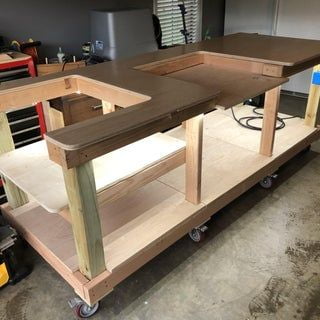How hard is it to learn how to do woodwork? Woodworking is a timeless and rewarding craft that has captured the interest of many individuals throughout history. From creating furniture, cabinetry, and decorative pieces to practical household items, woodworking allows for both artistic expression and functional utility.
In this article, we will explore the appeal of woodworking and delve into the challenges and obstacles that beginners may encounter when learning this craft. We will also discuss the importance of finding the right teacher or mentor, learning resources available, and the significance of hands-on experience in mastering the art of woodworking.
Woodworking has a universal appeal that transcends cultural and generational boundaries. The ability to transform raw wood into beautiful and useful creations is an enduring fascination for many people. The allure of working with one’s hands and creating something tangible from scratch is a driving force behind the growing interest in woodworking as a hobby or profession. It offers a sense of accomplishment and fulfillment that comes from producing something unique and functional.
Learning how to do woodwork involves understanding the basics of tools and materials used in woodworking, navigating through a learning curve filled with challenges, finding a suitable teacher or mentor, utilizing learning resources such as books, online tutorials, or classes, gaining hands-on practice, and overcoming frustration and failure along the way. These are just some of the aspects we will explore in this article as we encourage and inspire others to take up woodworking as well.
Understanding the Basics
Woodworking is a craft that requires an understanding of the basic tools and materials used in creating wooden masterpieces. Whether you are a beginner or someone looking to refine your skills, having a solid grasp of these fundamentals is essential for success in woodworking.
Essential Tools for Woodworking
An important aspect of understanding the basics of woodworking is familiarizing oneself with the essential tools needed for the craft. These include hand tools such as chisels, saws, hammers, and planes, as well as power tools like drills, sanders, and routers. Each tool serves a specific purpose in the woodworking process, and learning how to use them effectively is key to creating quality woodwork.
Choosing the Right Materials
In addition to knowing how to use various tools, it is equally important to have knowledge about different types of wood and other materials used in woodworking. Understanding the characteristics of different woods, such as their grain patterns and hardness, can greatly impact the outcome of a project. Furthermore, knowledge about other materials such as adhesives, finishes, and hardware is crucial in achieving professional results.
Learning about the essential tools and materials for woodworking may seem overwhelming at first, especially for beginners who are just starting out. However, with patience and dedication, acquiring this knowledge becomes an achievable goal. With access to resources like books, online tutorials, and classes geared towards teaching these basics, individuals can gain confidence in their ability to embark on their woodworking journey.
The Learning Curve
Learning how to do woodwork may seem daunting at first, but with the right mindset and resources, anyone can overcome the challenges and obstacles that come with being a beginner in woodworking.
Patience and Persistence
One of the major challenges for beginners in woodworking is developing the patience and persistence required to master this craft. It takes time to learn the skills and techniques needed to create beautiful and functional pieces of furniture or other wooden items. Many beginners may become frustrated when their initial projects don’t turn out as they had hoped, but it’s important to remember that woodworking is a skill that improves with practice.
Choosing the Right Projects
Another obstacle for beginners is choosing the right projects to start with. It can be tempting to tackle complex projects right away, but starting with simple projects allows beginners to hone their basic skills before moving on to more challenging tasks. Understanding which tools are best suited for beginners as well as learning how to properly operate and maintain them are crucial steps in conquering this challenge.
Developing Precision and Attention to Detail
Woodworking requires a high level of precision and attention to detail, which can be difficult for beginners who are still getting familiar with the tools and materials used in this craft. Learning how to measure accurately, cut precisely, and assemble components correctly takes time and practice. However, through dedication and perseverance, even novices can develop these essential skills.
By acknowledging these challenges early on in their woodworking journey, beginners can better prepare themselves for what lies ahead. With determination, patience, guidance from experienced woodworkers or mentors – and perhaps some trial-and-error along the way – mastering woodworking is not as hard as it may initially seem.
Finding the Right Teacher or Mentor
Woodworking, like any craft, requires guidance and instruction in order to master the skills and techniques involved. Finding the right teacher or mentor can greatly impact the learning process and overall success of a novice woodworker. One of the most effective ways to learn woodworking is through personal instruction from an experienced woodworker.
A skilled teacher or mentor can provide valuable feedback, demonstrate proper techniques, and offer personalized guidance tailored to the individual’s learning needs. They can also provide insight into the best tools and materials for specific projects, as well as practical tips for avoiding common mistakes that beginners often make. Additionally, having a mentor can help aspiring woodworkers stay motivated and inspired as they navigate the challenges of learning new skills.
When seeking a woodworking teacher or mentor, it’s important to consider their level of expertise, teaching style, and compatibility with your learning goals. Some beginners may prefer one-on-one instruction, while others may thrive in a group setting where they can interact with fellow learners. It’s also beneficial to seek out mentors who are open to answering questions and providing ongoing support as you progress in your woodworking journey.
| Woodworking Mentor Qualities | Importance |
|---|---|
| Expertise | Guidance on proper techniques |
| Teaching style | Compatibility with learning goals |
| Ongoing support | Motivation and inspiration |
Learning Resources
Learning how to do woodwork can be a challenging but highly rewarding endeavor. Whether you are just starting out or looking to improve your skills, there are a variety of learning resources available to help you along the way.
Books on woodworking offer in-depth knowledge and techniques that can guide beginners through the basics of the craft. Online tutorials and classes provide a more interactive approach, allowing students to learn from experienced woodworkers and even ask questions in real-time. With these resources, aspiring woodworkers can gain valuable insights into the tools, materials, and techniques necessary for successful woodworking projects.
When considering how hard it is to learn how to do woodwork, it’s important to recognize that each person’s learning journey will be unique. Some may pick up the skills quickly with the help of hands-on experience and mentorship, while others might find the process more challenging. However, with dedication and perseverance, anyone can learn how to create beautiful and functional pieces through woodworking.
| Learning Resource | Description |
|---|---|
| Woodworking Books | Provide detailed instructions and tips for beginners |
| Online Tutorials | Offer step-by-step guidance from experienced woodworkers |
| Woodworking Classes | Allow for hands-on learning and interaction with instructors |
Practice Makes Perfect
Learning how to do woodwork takes time, dedication, and patience. One of the crucial aspects of mastering woodworking is gaining hands-on experience. Here are some key points to consider about the importance of hands-on experience in woodworking:
- Understanding different types of wood: Hands-on experience allows you to familiarize yourself with different types of wood and their unique characteristics. By working with various woods, you can learn how they behave when cut, shaped, and assembled.
- Developing proficiency with tools: The more hands-on experience you gain, the better you become at using woodworking tools. Whether it’s a hand saw, chisel, or power drill, practice helps improve your skills and confidence in using these tools effectively.
- Learning problem-solving skills: Hands-on experience in woodworking provides valuable opportunities to solve real-time challenges that arise during a project. This process fosters critical thinking and problem-solving abilities that are essential for mastering this craft.
Asking questions and learning from mistakes: Hands-on experience allows for trial and error, providing opportunities for growth through mistakes. Becoming comfortable with making mistakes is an important part of the learning process in woodworking. As you gain more hands-on experience, you’ll be able to ask pertinent questions based on your experiences and learn from those who have already mastered the craft.
In essence, hands-on experience plays a fundamental role in the learning process for woodworking. The more time spent working on projects and honing skills, the closer one gets to mastery in this fulfilling craft.
Overcoming Frustration and Failure in Woodworking
Learning how to do woodwork can be a challenging but rewarding endeavor. As with any new skill, there will inevitably be moments of frustration and failure along the way. However, overcoming these obstacles is an essential part of the learning process and can ultimately lead to a greater sense of accomplishment. Here are some tips for overcoming frustration and failure in woodworking:
- Stay patient: Woodworking requires precision and attention to detail, so it’s important to take your time and not rush through the process.
- Learn from mistakes: Instead of getting discouraged by failures, use them as learning opportunities. Analyze what went wrong and figure out how to improve for next time.
- Seek advice from experienced woodworkers: Don’t be afraid to ask for help or guidance when you encounter challenges. Experienced woodworkers can offer valuable insight and tips for overcoming obstacles.
It’s also important to remember that everyone makes mistakes, especially when they are first starting out. The key is to persevere and keep practicing. Over time, as you gain more experience and honed skills, you’ll likely find that overcoming frustration becomes easier.
In addition, don’t be too hard on yourself. Woodworking is a craft that takes time to master, so it’s okay to make mistakes along the way. Embracing these challenges as part of the learning process will ultimately make success even sweeter when you achieve it.
Ultimately, by staying patient, learning from mistakes, seeking advice from others, and being kind to yourself along the way, you can overcome frustration and failure in woodworking while continuing to progress in your skill development.
The Reward of Mastery
Many people are drawn to woodworking because of the allure of creating something with their own hands. There is a sense of satisfaction and pride that comes with completing a woodworking project, especially after investing time and effort into mastering the craft. The reward of mastery in woodworking is not just about the finished product, but also about the journey of learning and honing your skills.
One of the most rewarding aspects of mastering woodworking is being able to see tangible results from your hard work. Whether you have crafted a beautiful piece of furniture, a decorative item, or even a simple household fixture, there is a deep sense of accomplishment that comes from seeing your creation come to life. The ability to transform raw materials into something functional and aesthetically pleasing is truly gratifying.
Furthermore, mastering woodworking allows individuals to customize their creations according to their own preferences and tastes. From choosing the type of wood to the finishing touches, skilled woodworkers have the freedom to express their creativity and bring their ideas to fruition. This level of creative control adds an extra layer of satisfaction that comes with mastering the craft.
In addition to personal satisfaction, becoming proficient in woodworking opens up opportunities for sharing your skills with others. Many master woodworkers find fulfillment in teaching and mentoring beginners, passing on their knowledge and expertise to inspire others to take up woodworking. The reward of mastery extends beyond individual achievement and extends into fostering a community of passionate woodworkers who support and encourage each other in their craft.
Conclusion
In conclusion, learning how to do woodwork may seem daunting at first, but with dedication and commitment, it is definitely achievable. The journey of mastering the craft of woodworking is filled with challenges and obstacles, but the satisfaction of creating something with your own hands makes it all worth it. Finding the right teacher or mentor can greatly help in overcoming these challenges and provides valuable guidance along the way.
With a plethora of learning resources available such as books, online tutorials, and classes, aspiring woodworkers have access to a variety of tools to aid them in their learning journey. However, the importance of hands-on experience cannot be understated. Practice truly does make perfect in woodworking, and the more time spent honing one’s skills, the more rewarding the end results will be.
It is important for beginners to acknowledge that frustration and failure are part of the learning process in woodworking. Everyone makes mistakes, but it is through these mishaps that one learns and improves. In mastering woodworking, persistence is key.
It is not about how hard it is to learn how to do woodwork; rather it’s about appreciating the journey and enjoying the fruits of your labor once you’ve achieved mastery. Ultimately, encouraging and inspiring others to take up woodworking can help create a community of passionate craftsmen who continue to keep this timeless art form alive.
Frequently Asked Questions
Is Wood Working Hard to Learn?
Woodworking can be challenging to learn, especially for beginners. It requires patience, precision, and a good understanding of different tools and techniques. However, with dedication and practice, it is definitely achievable.
How Long Does It Take to Learn How to Wood Work?
The time it takes to learn woodworking varies from person to person. Some may become proficient in a few months, while others may take years to master the craft. It depends on how much time and effort you are willing to invest in learning and practicing woodworking skills.
Can I Teach Myself Woodworking?
It is possible to teach yourself woodworking, especially with the abundance of online resources such as tutorials, videos, and forums available today. However, having guidance from experienced woodworkers or taking classes can greatly accelerate the learning process and help avoid common mistakes. Ultimately, self-teaching woodworking requires determination and a willingness to learn through trial and error.

Hi everyone! I’m a woodworker and blogger, and this is my woodworking blog. In my blog, I share tips and tricks for woodworkers of all skill levels, as well as project ideas that you can try yourself.





